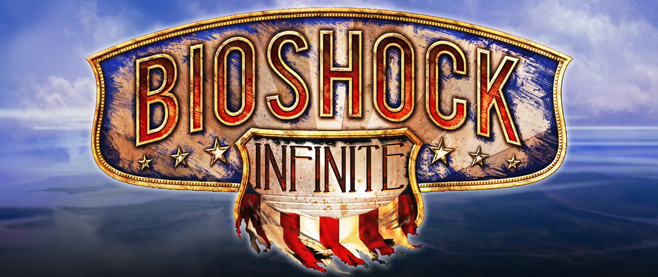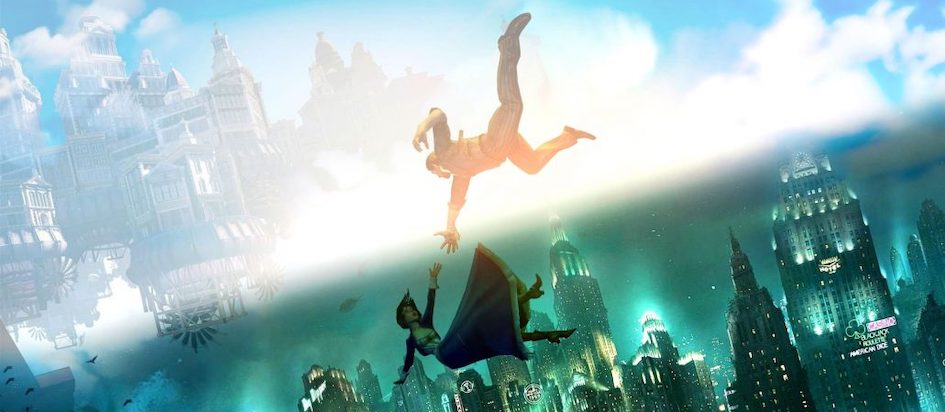
We Stared Into Infinity and Saw Only Madness
I was extremely late to the BioShock party. I remember playing the demo on Xbox Live. I floated down to a city in the sea (a ridiculous proposition at best), was met with art that felt cartoony compared to the military shooters I loved and fired archaic weapons like tommy guns and revolvers at people wearing vintage clothing. I was not interested.
It wasn’t until I began writing about videogames in 2010 that I discovered BioShock was an important game. BioShock was thrown in the face of claims that videogames weren’t art. I read about the theme of Objectivism and Ayn Rand and how wonderful the art deco design was and storytelling through environment and Little Sisters and Big Daddys and a lot about this auteur named Ken Levine.
[pullquote]Complaining that the violence in BioShock Infinite isn’t necessary feels like a complete misread of the story.[/pullquote]
I read so much about the damned game that I felt I didn’t need to play it anymore. That felt increasingly irresponsible the further I progressed in my career as a writer-about-videogames, so I picked up BioShock in 2012 and finished it in February of this year, because I felt the need to do so before BioShock Infinite was released.
I had a vastly different experience with BioShock than what the critical consensus suggested I ought to have had. It’s probable that reading so much about the game beforehand ruined my opportunity to experience any sense of wonder. Playing BioShock was like having read a hundred first-hand accounts of trips to a foreign country and having seen hundreds of photographs of key landmarks from all the angles and then going to the country in person. The only surprise BioShock had in store for me was, “Would you kindly?”
———
When Irrational Games began development of BioShock Infinite, they could not have imagined the state of videogame criticism in 2013.
E3 2012 was the site of a rebellion of sorts, when large segments of the videogame press turned on the preponderance of violent, mainstream fare on display at the show. The presence of booth babes at E3 faced sharper criticism than ever before. Issues of race and gender equality loomed large at the Game Developers Conference this year, an event which is also being hailed as if it were a tipping point or sea change in the relationship between independent game development and the AAA industry.
Chris Plante wishes that his wife could have played a game about “American exceptionalism, religious zealotry, the limitations of science and poor parenting,” but she was turned off by the killing in Infinite. Kirk Hamilton goes further and states that Infinite is so insanely and ridiculously violent that it’s a shame. Michael Abbott thinks “as valiantly as it tries to explore social-political issues, Infinite is tethered to its mechanical nature as a shooter in ways that undermine its aspirations.” Courtney Stanton ruthlessly tears into her dissatisfaction with how Infinite handles issues of race.
The criticism of BioShock Infinite that struck me the most was Leigh Alexander’s piece on her blog, Sexy Videogameland. Alexander’s critique contains and mirrors all the other pieces of criticism I’ve pointed at, but her writing felt downright mournful as she recounted the emotional nature of her visit to Rapture in BioShock compared to the emptiness she felt on her tour of Columbia in Infinite. It’s the most damning take down of BioShock Infinite I’ve read thus far, but it’s couched in comparison to BioShock. I appreciate her critique most of all because she’s blunt about the comparison taking place whereas others merely suggest or allude to it.
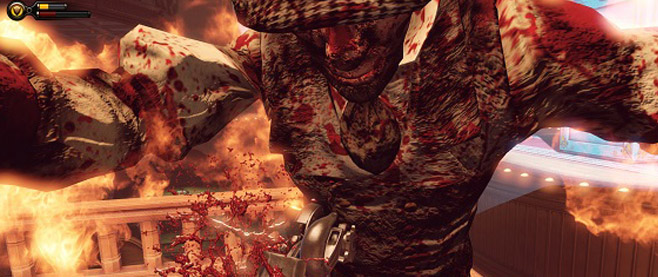
BioShock was not a profound experience for me. I felt moments of joy every time I saved a Little Sister and those were my favorite moments in the game, but I forgot about Rapture’s art deco style when I was blasting Splicers and murdering Big Daddys. The repudiation of Objectivism felt obvious and immediate and I forgot about it quickly. I recognized the uniqueness of BioShock compared to most of the other shooters I’ve played, but it didn’t feel like the milestone in videogame development I’d been expecting. It was a very cool shooter with a questionable ending.
My context for the experience of playing BioShock was a videogame industry replete with examples of artistically valid and emotionally powerful videogames pouring out of the indie scene. I have to account for how that affected my reaction to BioShock, but I’m glad for the critical distance and the lens through which I viewed the experience. I can’t imagine that if the original BioShock were released today it would have garnered nearly the same critical reaction as it did in 2007.
I don’t want to assume what anyone else’s experiences with art or indie games were when they played BioShock back then, but maybe it was considered such a revelation because it didn’t have much competition? It certainly doesn’t seem like it did if I peruse a list of what else was released that year. Maybe BioShock was so breathtaking to critics because it was a game intended for mainstream consumption, not an off-the-radar indie game one might expect to have more artistic validity by default.
When you’re dying of thirst, a brackish puddle of water is the most delicious water you’ve ever tasted. Not that BioShock was a brackish puddle of water. It’s an imperfect metaphor because I have much more respect for BioShock than the metaphor implies, but hopefully you take my meaning.
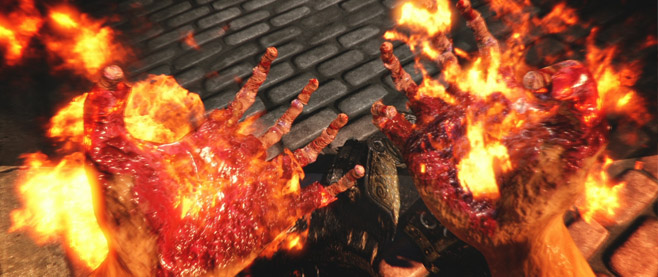
When I read criticism that BioShock Infinite is too violent I can’t wrap my head around it. I was also surprised by the violence early in my playthrough of Infinite, but I realized that was only because I didn’t expect the violence in a BioShock game. When I shucked off my preconceived notions about what a BioShock game ought to be, I considered the six years that had passed between the two games.
When I shoot someone at close range with an explosive shotgun in last year’s Borderlands 2, I watch their body fall apart into bloody chunks. That BioShock Infinite is in line with current trends among shooters is not a problem in my mind. No one ever said it wasn’t going to be a shooter for shooter players, and the standards for shooter fare have changed.
I think reactions to Infinite’s violence have a lot to do with the change in environment. When you bashed a Splicer in the head with a wrench in BioShock, the blood looked more like purple goo than blood, and this was forgivable considering the game largely takes place in shadow. When you bash someone with a Sky-Hook in Infinite, you’re often doing so in the light of a bright, sunny day, so now the blood is closer to the dark crimson color it ought to be.
Is using a Sky-Hook to break necks actually more violent than smashing someone in the face with a wrench or is the violence more gory, which is an entirely different observation? And in recognizing the presence of that gore do we also account for the advances in visual fidelity in the intervening six years between BioShock and BioShock Infinite? I feel it would be exceedingly silly not to expect the violence in BioShock Infinite to look different than the violence in BioShock and to then hold that against Infinite.
I can’t make sense of criticisms that the violence in Infinite makes the game inaccessible. Why should BioShock Infinite be any more accessible to someone who doesn’t play first-person shooters than Call of Duty? Why hold Infinite up to different standards in this regard? Because its environment is more thoughtfully crafted? My wife also might have been interested in BioShock Infinite if not for the shooting, but that’s not a knock against Infinite. That’s a statement about what kind of games my wife does and doesn’t like.
Complaining that the violence in BioShock Infinite isn’t necessary feels like a complete misread of the story. The violence is essential. Infinite makes sure the player understands Booker DeWitt did something horrible at the Battle of Wounded Knee, and rather than describing that horror, the game shows the player in every combat sequence. The violence both defines DeWitt’s desperate need for spiritual rebirth and explains how even that radical transformation can’t cleanse him of the evil he’s done. It lives on through Father Comstock’s desire to rain fire upon the world and punish humankind for its sins.
Maybe no one’s made this point because they’re afraid of spoiling the ending, but saying the violence in BioShock Infinite isn’t necessary is disingenuous if the critic groks the narrative.
When I read criticism that BioShock Infinite doesn’t live up to its narrative expectations, or that it ought to have something to say about the social and political problems it observes but does not, I think back to the original BioShock and wonder whether “Objectivism is bad” is actually saying something meaningful about the social and political systems it observes.
If the original BioShock didn’t have anything substantive to say about Objectivism, then why hold Infinite up to a different measuring stick and suggest that if it doesn’t have substantive commentary on racism and classism and American exceptionalism, that the omission is a failing this time around? I didn’t expect deep philosophical discourse from Infinite because I didn’t see it in BioShock. Like Ian Bogost recently said on Twitter, “The biggest lie about BioShock 1 is that it had anything to say about Rand.”
I am not arguing that people shouldn’t be criticizing BioShock Infinite. It has a lot of problems that go beyond clipping and inappropriate responses when Booker catches a coin from Elizabeth, like saying “Perfect timing!” when they’re standing in a ladies’ room. It’s the nature of the criticism around Infinite that’s shocking, because it sounds like people are upset for not getting things I don’t think they should have expected to get, or reacting poorly to getting content they ought to have been expecting.
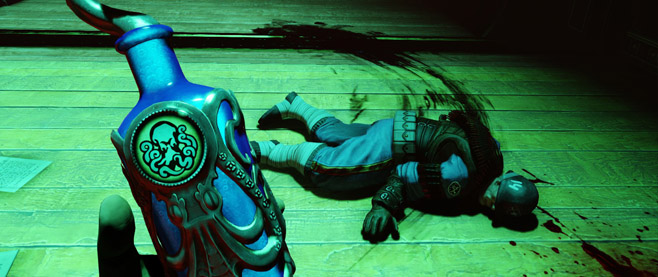
I return to Leigh Alexander’s critique, which I admire for two reasons. She hits upon what I think is the most salient criticism of BioShock Infinite for our discussions moving forward: Infinite does not have the same weight of storytelling through mise-en-scène as BioShock did. She also cuts straight to the bone about what I think is going on in the predominant criticism of BioShock Infinite.
I didn’t have the same emotional relationship with BioShock that Alexander did, and that relationship is the basis for her holistic analysis of BioShock Infinite. She isn’t prescriptive. She doesn’t say anything is a shame. She doesn’t pronounce who the game ought to have been accessible to. She doesn’t mock. She constantly voices her disappointment in BioShock Infinite in light of how she felt about BioShock.
Criticism is about assessing what a piece of art attempted to achieve and whether or not it achieved it. I think perceptions about what BioShock Infinite is trying to achieve have been distorted by idealized memories of what we thought BioShock meant to achieve, and therefore much of the criticism of Infinite feels off to me. It is being expressed as disappointment for Infinite not doing things the game ever purports to be doing, because people think BioShock was doing things it didn’t and they expected those illusory pursuits from BioShock Infinite as well.
BioShock was a study in mise-en-scène and in-engine storytelling that took place in a superlatively-crafted environment. It was not a profound statement about Objectivism or made any attempts to sublimate first-person shooters. What made BioShock important was that critics could attempt to read deeper themes into the game and have those discussions in front of the mass audience. BioShock was an accessible way for critics to explain to everyone what craft meant in game design.
I think BioShock Infinite is just as important for exactly the same reason. I disagree with a lot of the criticisms being levied at the game. I also celebrate the fact that these conversations are being conducted in a much more visible fashion than might otherwise be the case, owing to how high-profile the game is. Mass market videogame consumers are far more likely to read critical discourse around one of the most important AAA releases of 2013 than they are to read a discussion of the themes in a game like Cart Life, which is off their radar entirely.
I agree with Leigh Alexander that we stand in a crucial moment, and I am thankful to BioShock Infinite for making this moment possible. And maybe by understanding this moment I also finally understand why everyone reacted to BioShock the way they did, even if I didn’t share the experience with them.
———
Dennis Scimeca is a freelance writer from Boston, Massachusetts. He will be opining about the tragedy of violent videogames on Twitter @DennisScimeca.


